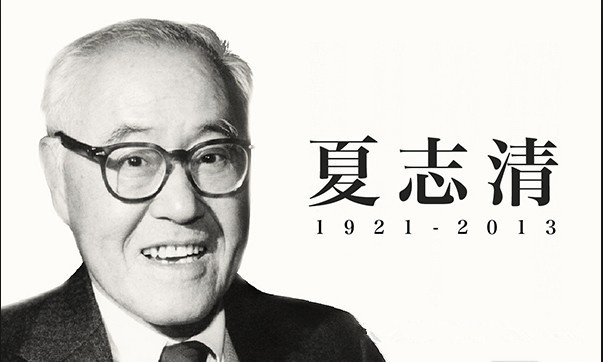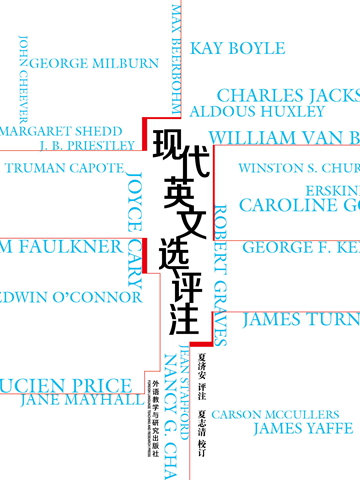查建英:在夏志清老师葬礼上的悼词

坎贝尔殡仪馆
麦迪逊大道1076号
纽约
2014年1月18日
当我第一次敲响夏志清教授在哥伦比亚大学办公室的门时,我几乎都能听见自己的心跳声:我已在“中国现代小说”课上拜读过他的经典著作,而且明白自己即将跟随这位中国文学史领域巨擘学者学习。然而,夏志清先生用响亮甚至有些吃惊地语气对我说的头一句话居然是:“啊,你来了,你真高!”他攥住了我的双手,一边有力地摇晃一边说:“你有多高?六英尺?你怎么会这么高呢?在中国大陆时营养不错!”
我解释说,我在南卡罗来纳大学的英语系呆了三年后,之所以选择哥伦比亚大学是因为我想到纽约来跟随他学习,夏教授爽快地回应说:“你当然会选择我!不过好在你没有从北京直接飞到纽约,否则你就只能在唐人街解决吃饭问题,而且会和其他中国人混在一起,二十年内你的英语水平仍然不会有起色!”
他毫无保留的率直让我吃惊,但与此同时我也如释重负,并且很快就变得放松起来。我立刻明白他是一个拥有真才实学的人,但这位独特的导师一点也不自命不凡,而这也许是我之前在潜意识中一直害怕的。
我回忆这些内容是因为我想每个熟悉夏教授的人一定有他们自己的体验版本,这也许会唤起你一种做他学生的感觉。夏老师是一个直言不讳的人,我知道有一两个学生也许很怕他,但大多人都单纯地热爱着他。
他的教学风格就像他的为人:开放、松散、古怪、在智力上富有挑战性。他希望我们能如饥似渴地阅读并且用力地思考,就像他自己那样。在教室里,他不会讲授长篇大论,而是会给出对文学和历史敏锐的见解和精辟的观点。他讨论在上海看过的好莱坞电影,告诉我们那些他独自挖掘并且放置于文学史地图上的才华横溢却默默无名的作家们,关于他们的引人入胜的故事。他督促并激励我们质疑和辩论,与此同时他会边抽烟边大笑,似乎是在起居室里和朋友交谈一样。我记得自己走出教室时,怀揣薄薄的笔记本,却带着更强烈的热望,渴望读得更多,发现得更多,并且怀有一种非常强烈的态度,认为人们不该仅仅因为它已成型或正时髦,就用一种学院式或方法论式的态度去理所当然的对待某种文学体系。
深深扎根于人文主义和新批评传统之中,夏教授从不掩饰他对新理论的怀疑,正如他公开自己的政治见解一样。然而他指导学生却是用一种激情和自由混杂式的方法。作为一个比较文学系的学生,我会上一些理论课程,而我记得夏教授曾坚持要读我写的一篇法国教授开的符号学课程的论文。随后他用一连串问题来炮轰我,包括那位教授的口音——我想,他是在检验我对于符号学课的兴趣是否更多的是被法语口音的魅力吸引,而非符号学理论本身的价值。最后他确信,我的论文没有改变他对符号学的观点,但是他也认为这篇论文很有意思,我有资格被推荐。
他是个写严肃之作的有趣之人,一个并非犬儒主义者的直言不讳的批评家,一个从不停止学习的老师,一个能欣赏任何一种文化中精华的世界主义者。除了才思敏捷,见解深刻独到之外,他还是一个非常温暖亲切的人,不遗余力地帮助学生或提拔年轻人。他的人生曾失去过很多东西,但却仍然保有赤子之心。
我是众多人中十分幸运的一个,不仅于他的著作中受益良多,而且也得益于他的教导、谈话和友谊。他对我和其他许多人的工作和生活产生了巨大的影响和激励。
我深爱的导师,谢谢您!愿你的灵魂安息。你的教导,你的精神,你的音容笑貌,将会长存我心。
文|查建英(作家)
译|新京报记者柏琳
●夏志清(1921年2月18日-2013年12月29日),江苏吴县人,生于上海浦东,中国文学评论家。代表作《中国现代小说史》。发掘了钱钟书与张爱玲、沈从文等作家。
-------------------------------------------------------------------------------------------
【原文】
Remarks by Zha Jianying at Professor C.T. Hsia’sFuneral
Frank E. Campbell
1076 Madison Avenue
New York City
January 18, 2014
When I first knocked on the door of Professor C.T.Hsia’s Columbia office in the fall of 1984, I could almost hear my ownheartbeat: I had read his classic book onmodern Chinese fiction and was veryconscious that I was about to meet and study under a scholar who is a giant inthe field. But the very first thing hesaid to me, in a loud voice and ashocked, accusing tone, was this: “Ah, so here you are, you are tall!” Hegrabbed both of my hands, shaking them forcefully as he kept going: “How tallare you? Six feet? Howcan you be so tall? Better nutrition in mainland China!”
And when I explained that,after three years in theEnglish department of University of South Carolina, I chose Columbia because I wantedto be in New York City and to study with him,Professor Hsia issued anotherrapid-fire response: “Of course you'd choose me, of course! But a good thingyou didn’t come to New York straight from Beijing,or you’d be eating inChinatown and hanging outwith other Chinese and in twenty years your Englishwould still be awful!”
His disarming candor startled me, but I was alsohugely relieved and quickly became at ease. I knew there and then that this isthe genuine article, and I have found a unique mentor, whowould be anything butan overbearing stuffed shirt, which I probably dreaded subconsciously untilthat moment.
I’m recalling this because I think everyone who knewProfessor Hsia must have experienced his or her version of such moments, andbecause this might give youa sense of how it felt to be his student. Not ateacher who minced his words incritique, I knew one or two students who wereterrified of him, but most of ussimply loved C.T. Hsia.
His teaching style was like his personality: open, loose,quirky, and intellectually challenging. He expected us to read voraciously andto think hard, as he did himself. In the classroom,he was not known fordelivering long, meticulous lectures, but for providingsharp insights and pithyopinions on literature and history. He talked about watching Hollywood moviesin Shanghai, and told fascinating, revealing stories about brilliant, neglectedauthors whose work he had single-handedly rediscovered and placed on the map ofliterary history. He urged and stimulatedus to question and to debate, while hesmoked and laughed out-loud, as though talking with friends in his own livingroom. I remember walking out of his class with a slim notebook in hand but aswelling hunger to read more, discover more, and with a certain fierce attitudethat one should not take any academicview or methodology for granted justbecause it’sestablished or in fashion.
Deeply embedded in a humanisticand New Criticismtradition, professor Hsia did not hide his skepticism about ahost of newtheories, just as he was outspoken about his political views. Yethe guided hisstudents with a mixture of passionate opinion and lassie-faire liberalism. As astudent in Comparative Literature, I took some theory coursesand I rememberProfessor Hisa’s insistence on reading my paper for a French professor’s courseon semiotics. Hebombarded me with questions afterwards, including theprofessor’s accent – I think he was checking whether my fascination withsemiotics might have less todo with the value of the theory than the charmingspell of the French accent.In the end he assured me that my paper did notchange his mind about semiotics,but he also said that it was interesting enoughand I was to be commended.
He was a funny man who wrote serious books, a bluntcritic who was never cynical, a teacher who never stopped learning, acosmopolitan who appreciated excellence in any culture.Quick witted, incisiveand brilliant, he was also a very warm and endearing human being, sparing noenergy in helping students or promoting young scholars.He had endured deeppersonal losses in life, but remained a sunny, loving character. Always thecenter of a party, he had a rare quality that brings tomind an old Chineseexpression: 赤子之心.
I was fortunate to be among those who not onlybenefited greatly from his books and writing, but also from his teaching,conversation, and friendship. He has been a great influence and inspiration inmy and many others’work and life.
Beloved teacher and mentor,thank you! May your soul restin peace. Your teaching, your spirit, and your laughter, will always remainhere with us.







 京公网安备 11010802032529号
京公网安备 11010802032529号